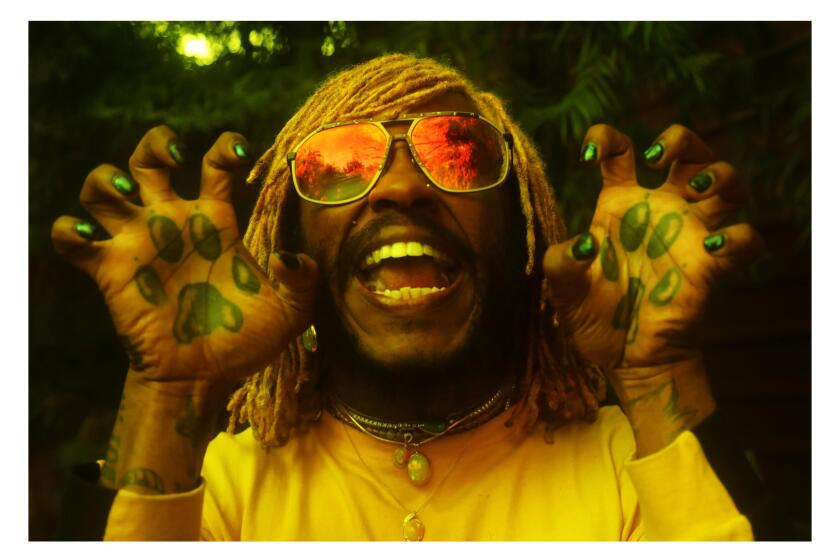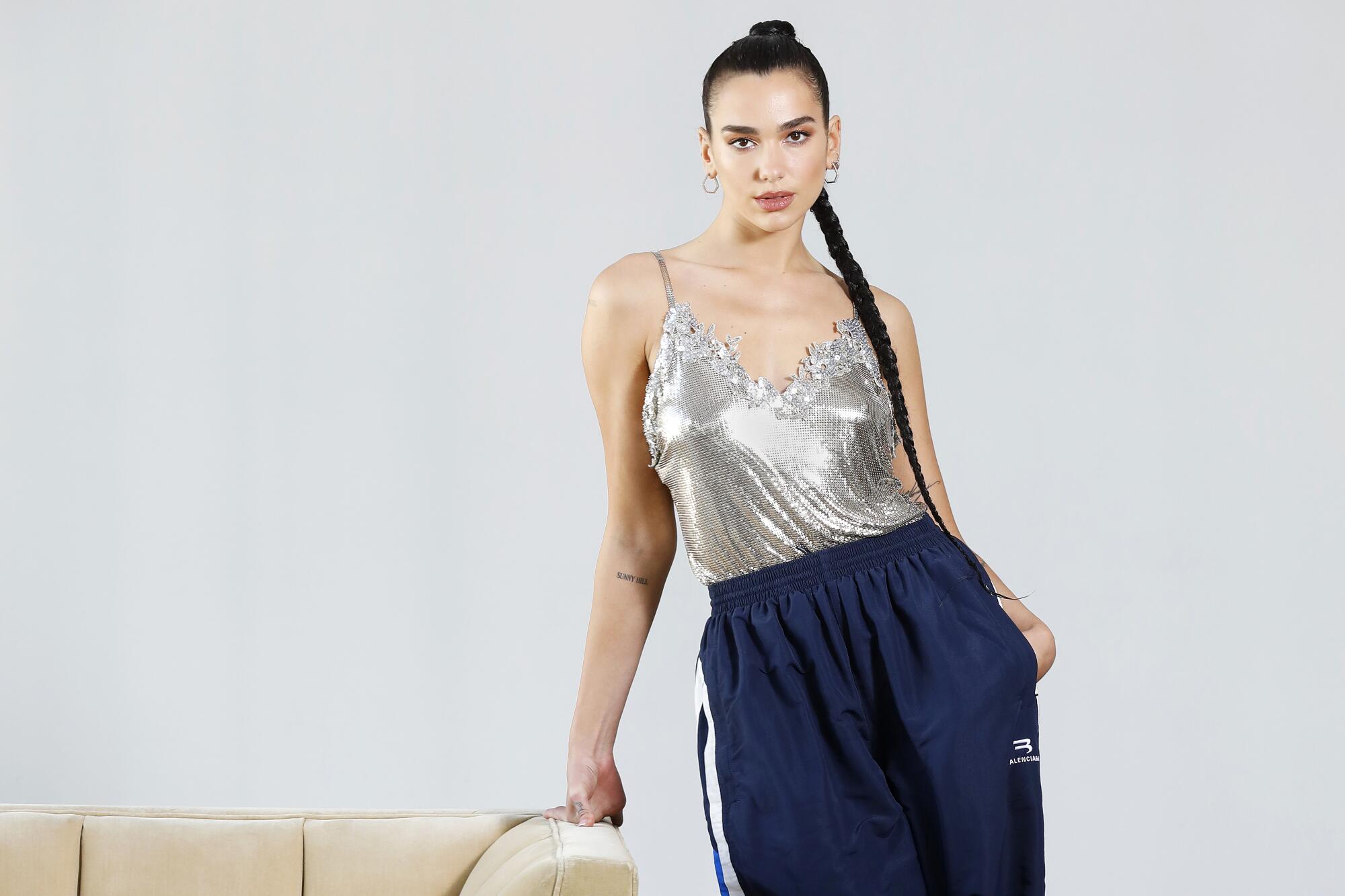
- Share via
When Dua Lipa was 15 years old, she left her parents and two younger siblings behind in the family’s native Kosovo and moved more or less on her own to London.
The plan, at least as understood by her mom and dad (who’d only agreed to it because she’d be rooming with the older daughter of a family friend), was to finish high school and then enter university. By the time Lipa graduated, though, she’d turned her focus to music, posting covers online and recording hooky originals she co-wrote while supporting herself as a hostess at a Mexican joint in London’s Soho neighborhood.
“I kept telling my parents, if I take a gap year, then I don’t have to pay off my university debt,” the singer says today with a laugh.
Asked how long she was willing to stretch that gap year — how long she was prepared to grind in the hopes of becoming a pop star — she smiles as though amused by the misconception that she’d been struggling.
“That was a great life — I was working in a restaurant, I was partying all night, then I’d wake up in the morning and go to the studio,” she says. “I had so much fun.”
Longtime friends and collaborators Thundercat and Flying Lotus are each nominated for a Grammy Award for ‘It Is What It Is,’ an album marked by loss.
But also: A struggle suggests she might have accepted anything less than success.
“I’ve always been persistent, and I’ve always fought for the things that I’ve wanted,” Lipa, now 25, says in her crisp English accent. “So as much as this was my passion, I feel like it was also my destiny.”

A decade after she set out from home, it’s tempting to think she was right. Last year, Lipa’s “Future Nostalgia” — a sophomore LP full of sticky vocal melodies, shimmering guitar licks and crazy-funky bass lines — topped the U.K. album chart and was certified gold in the U.S. “Don’t Start Now,” the project’s disco-throwback lead single, has been streamed nearly 2 billion times on Spotify and YouTube.
In November, more than 5 million people tuned into an elaborate, Studio 54-inspired livestream that featured cameos by Elton John, Bad Bunny and Kylie Minogue, the last of whom praised Lipa’s “clever songwriting” and “instantly recognizable voice” in a tribute she wrote when Time magazine put Lipa on its Next 100 list of young influencers.
“Massive icon,” Lipa says, returning the favor, of Minogue. “For her to even know who I am is mad.”
Now Lipa, named best new artist at the Grammy Awards in 2019, is among the most-nominated acts at this month’s 63rd Grammys ceremony, where she’s up for six prizes, including album, record and song of the year. (Only Beyoncé has more nods.) Though the Recording Academy has yet to detail plans for the show, set to take place March 14 in Los Angeles, Lipa is widely expected to perform on the CBS telecast.
Says Tom Corson, cochairman of Lipa’s label, Warner Records: “What we’re seeing is the dawning of a new superstar.”
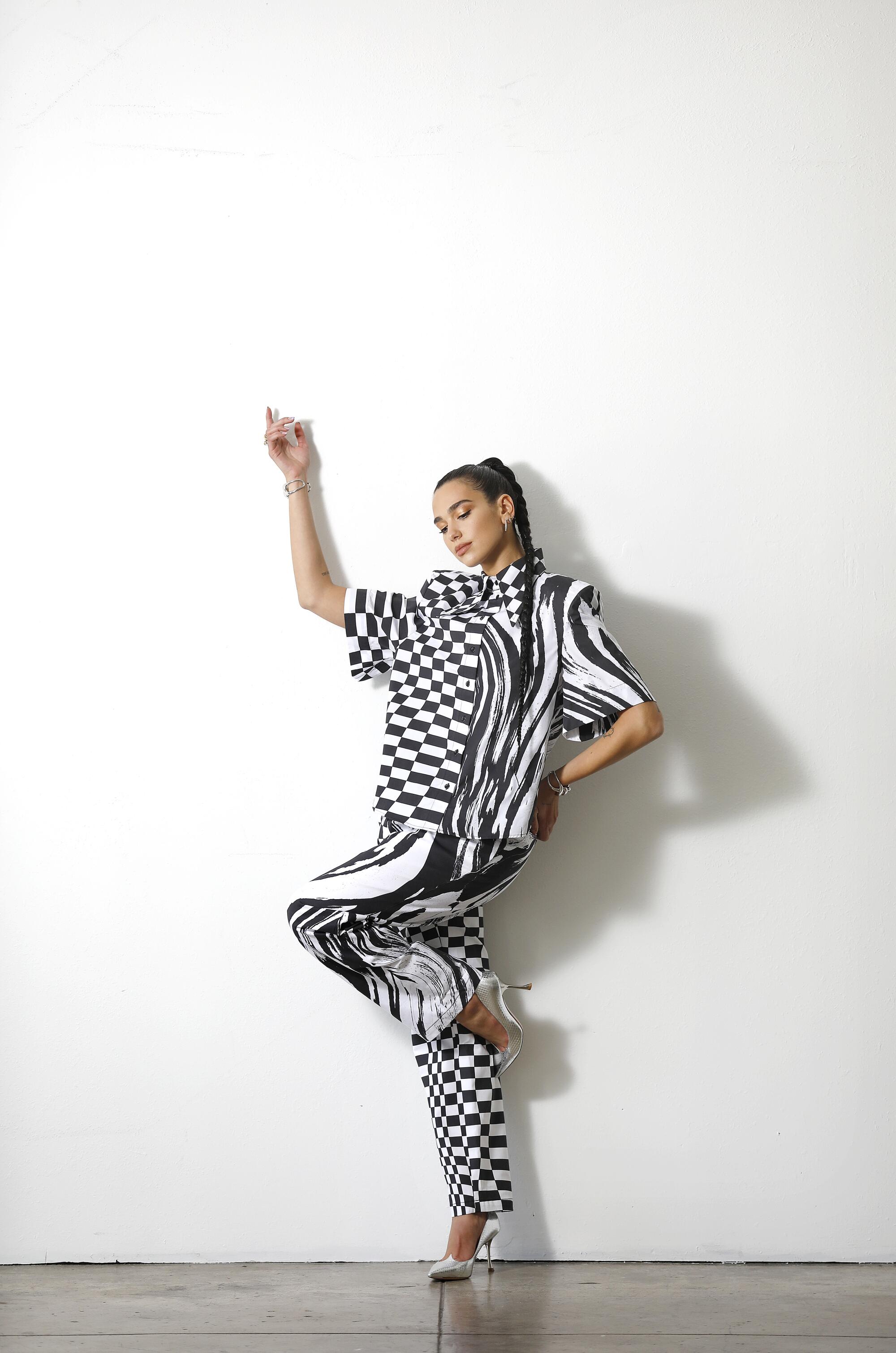
According to Grammy oddsmakers, “Future Nostalgia” trails Taylor Swift’s rootsy “Folklore” for the highly coveted album award, which Swift has won twice since 2010. Yet academy members have demonstrated a soft spot for the kind of crafty, intricate, hand-played dance music that Lipa’s disc represents: In 2014, Daft Punk upset expectations when the French duo beat their highly favored competitors (including Swift’s blockbuster “Red”) to take album of the year with “Random Access Memories.”
Lipa says the beautifully rendered “Future Nostalgia” is meant to evoke memories of music by swank ’70s and ’80s acts like Blondie and Chic — the latter of whose Nile Rodgers featured prominently on “Random Access Memories” — and to put across a more unified vibe than her grab bag of a self-titled 2017 debut.
Lipa’s album spawned a couple of monster streaming hits in “IDGAF,” a tart kiss-off with marching-band drums, and “New Rules,” which layers her low, husky singing over a sleek, EDM-ish beat. But “the only thing that connected each song was my voice,” as Lipa puts it in a video call from her place in L.A.
A reliably glamorous presence on magazine covers and in music videos, the singer is low-key this morning in a baggy tie-dyed top and purple beanie as her dog, a black Lab mix named Dexter, clambers onto the couch beside her. Lipa, who lives with her boyfriend of nearly two years, model Anwar Hadid (younger brother of fashionistas Bella and Gigi), gladly splits her time between here and London, though she admits she didn’t warm right away to L.A. — in part, perhaps, because her first crash pad was a “random Airbnb in the depths of Hollywood with bars across the door.”
“It said Santa Monica Boulevard, and I was like, ‘Oh, I’ve heard of that street,’” she recalls of the listing. “Little did I know. Now I love it here.”
Producer Stephen “Koz” Kozmeniuk, who helped build both of Lipa’s albums from the ground up, says the singer wanted “Future Nostalgia” to reflect her buoyant mood. “She was happy, feeling good — like, ‘I just wanna dance,’” Koz says. “It was also a bit of a reaction to the fact that all the other music in the world was quite down at the time — the Billie Eilishes and all the trap stuff.”
Lipa, of course, didn’t know that COVID-19 was looming as she completed her big feel-good statement in early 2020. But when it came out last March, the album ended up offering a welcome escape from a quickly darkening reality. What’s more, “Don’t Start Now” touched off a plague-times disco revival that yielded pleasure-obsessed hits by the likes of Lady Gaga, Harry Styles and Doja Cat, whose “Say So” is nominated against “Don’t Start Now” for record of the year.
“Something this pandemic has taught us, I think, is to live in the moment,” Lipa says.
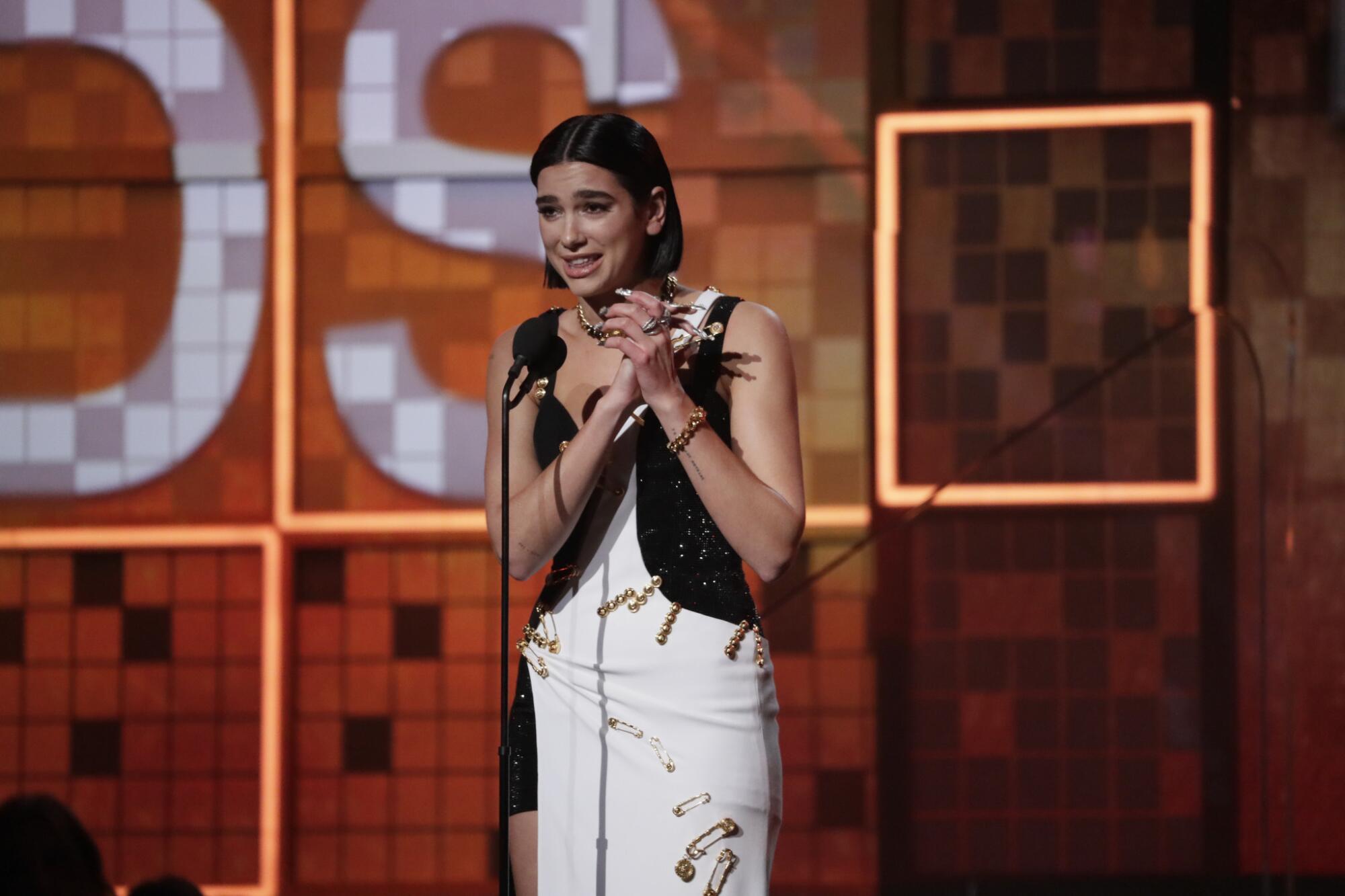
If space got crowded under the glitter ball, Lipa still stands out. For starters, there’s the exceptionally wide range of her appeal, which in recent months has led to both a collaboration with the hip-hop boy band Brockhampton and a country-fied cover of “Don’t Start Now” by Nashville’s Ingrid Andress. (Among Lipa’s other duet partners of late are Miley Cyrus, J Balvin, DaBaby and Andrea Bocelli.)
“Dua is super-cool,” says Brockhampton’s Kevin Abstract, a hero to Supreme-clad kids more attuned to Camp Flog Gnaw than to the Hot 100. What did his fans make of Lipa’s appearance on a remix of Brockhampton’s song “Sugar”? “They were probably like, ‘Whoa, I didn’t expect this — but why does it kind of work?’” Abstract says.
There’s also Lipa’s unique handling of her celebrity. At a moment when music by many female pop stars is scrutinized for insight into their private lives — be they established A-listers like Swift and Ariana Grande or up-and-comers like Olivia Rodrigo of “Drivers License” fame — Lipa’s songs resist a closely personal read. It’s not that they’re unfeeling; bangers such as “Levitating” and “Hallucinate” combine whooshing grooves with words about bodies in motion to create something downright ecstatic.

But the music tends proudly toward abstraction; it’s seeking to embody the emotional experience of love or sex or adventure, rather than inviting you to ponder any given episode between her and Hadid. And because she’s such an expressive singer, with loads of texture in her voice, she pulls it off.
“Dua brings a real star quality to her songs,” says Sarah Hudson, a veteran songwriter who’s worked with Katy Perry and Camila Cabello and who wrote “Levitating” with Lipa, Koz and Clarence Coffee Jr. “But she’s slightly mysterious. At the same time, she’s so genuine that you feel close to the music.” Hudson is right: You feel close to the music, if not necessarily to Dua Lipa herself.
Polished but forthright in conversation, Lipa cops to a certain self-protective instinct after a few years in the limelight. “I’ve grown to be more private because so much of my life is public, and I probably censor myself more than I used to,” she says. “I also don’t love the idea of making music for headlines or for controversy.” She’s seen “Framing Britney Spears,” the much-discussed documentary about the teen pop star’s treatment in the tabloid economy of the mid-’00s, and says she can relate to a sense of being violated by paparazzi.
“The feeling of going down the street and they’re trying to catch you in this very awkward picture — it can be anxiety-inducing, honestly,” she says. “And Britney’s time was pre-Instagram when everything was purely about the tabloids, and there were no laws in place about what paparazzi were allowed to do. She was being harassed — that’s exactly what it was.”
Though paparazzi shots can “still circle the internet — you looking nuts after you’ve just woken up trying to get to the gym,” as Lipa puts it with a shudder — Instagram has fundamentally changed the way we see pop stars. Yet curating her presentation hasn’t prevented her from being called out online by fans who’ve questioned her need to travel to so many exotic locations during a pandemic.
“There are a lot of eyeballs on my social media,” she says, somewhat philosophically, of being judged on occasion by some of her 61 million followers. “But I’m very much the same person onstage as I am at home.” Her point seems to be that she never puts on the persona of a jet-setting glamazon; the reality can seem more like she never takes it off.
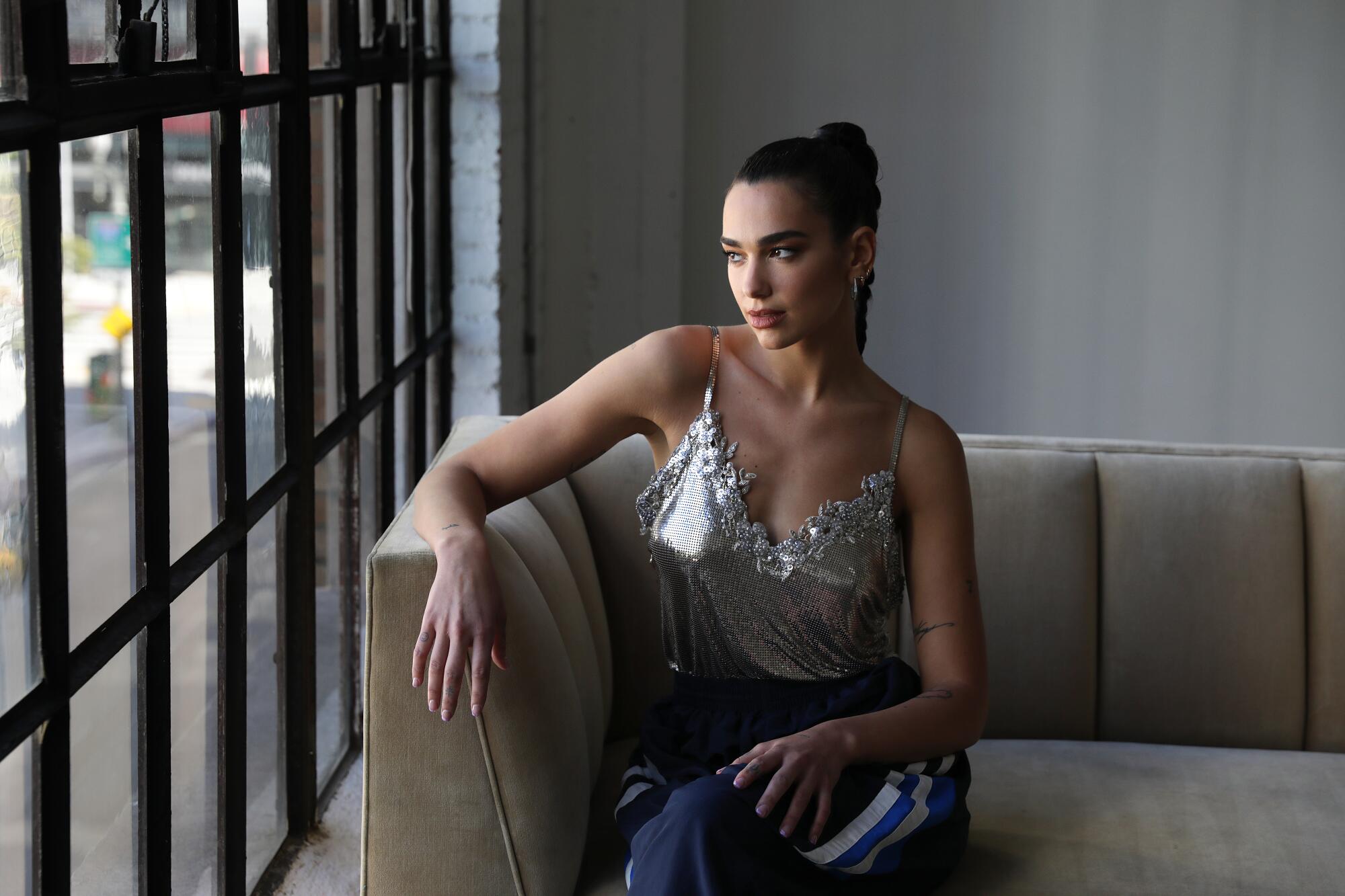
Indeed, there’s a let-them-eat-cake quality to her stream of carefully styled photos that, along with her aversion to oversharing, registers as another difference between Lipa and her ostensibly relatable American counterparts. The singer’s European-ness — more Posh Spice than Amy Winehouse — feels essential to her identity, which hasn’t been true of a breakout female act in this country for ages.
Lipa was born in London but moved to Kosovo at 11 when her parents, who’d emigrated during the Balkan conflicts, deemed it safe to come back. In Pristina, the country’s capital, she “learned about my roots,” she says, played basketball at school (she stands a willowy 5-foot-8) and perfected her Albanian, which she still uses daily with her family and in text messages with her old friends.
Returning to London as a teenager was a product of her need to “be in a place where everything was happening,” she says, including the club culture she soon discovered. “Future Nostalgia” showcases Lipa’s earnest embrace of dance music and its rich history; she even released a companion remix album, “Club Future Nostalgia,” with new versions of the songs by house and techno O.G.s such as Moodymann, Larry Heard and Masters at Work.
“Her investment is totally legit,” says the Blessed Madonna, the respected DJ and producer who oversaw the remix set. “To me Dua is the pop girl who really gets it.”
Dua Lipa’s new remix album, “Club Future Nostalgia,” features guest turns from Missy Elliott, Gwen Stefani and Madonna, and cements Lipa’s place at pop’s apex.
The Blessed Madonna worked with Lipa again on last fall’s splashy livestream, which they called “Studio 2054.” For the singer, it was a place to pour all the energy and ideas — and all the costumes and choreography — she had for the “Future Nostalgia” tour, which has been postponed twice due to the pandemic but which she hopes finally to launch later this year.
“I woke up this morning to news about measures being lifted in the U.K.,” she says. “By September it might be looking good.”
Asked what she finds so intriguing about Studio 54, Lipa — who says she’s been reading scripts for a move into acting that seems all but inevitable — replies, “I love the spectacle of what was basically a theater production in a nightclub.” But she also describes the elevation of hedonism to a kind of fine art.
“I’ve spoken to Elton John all about it. And Chic wrote a song about not being allowed into the place,” she says, referring to the band’s classic “Le Freak.” “That was inspiring to them. So you can only imagine what it was like being inside.”
More to Read
The biggest entertainment stories
Get our big stories about Hollywood, film, television, music, arts, culture and more right in your inbox as soon as they publish.
You may occasionally receive promotional content from the Los Angeles Times.
